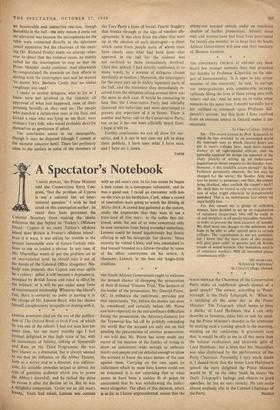LENNOX ROBINSON died on the eve of the publica- tion
of The Oxford Book of Irish Verse, of which he was one of the editors. I had not seen him for Some time, but not many months ago I had listened delighted to that high voice of his, with its intimations of felinity, talking of Somerville and Ross on the Third Programme. He was best known as a dramatist, but it always seemed to me that his influence on ttie Abbey Theatre, both as a writer and as a director, was unfortu- nate; his amiable comedies helped to attract the type of gormless audience which was to prove the Abbey's downfall, and he lacked the drive to rescue it after the decline set in. But he was a delightful companion. 'Grant me an old man's frenzy,' Yeats had asked; Lennox was content with an old man's zest. In his late sixties he began a new career as a newspaper columnist; and he was a good one. I recall an encounter with him on the train to his birthplace, Cork, when a crowd of journalists were going to watch the filming of Mob), Dick. A crowd had gathered at the station, under the impression that they were to see a train-load of film stars: in the melee that fol- lowed, while the rest of us were concerned only to save ourselves from being trampled underfoot, Lennox could be heard lugubriously but firmly offering to sell his autograph 'for charity.' More recently he visited China, and was astonished to find himself branded as a fellow-traveller by some of his sillier countrymen on his return. A character, Lennox, in the best old Anglo-lrish tradition.


































 Previous page
Previous page